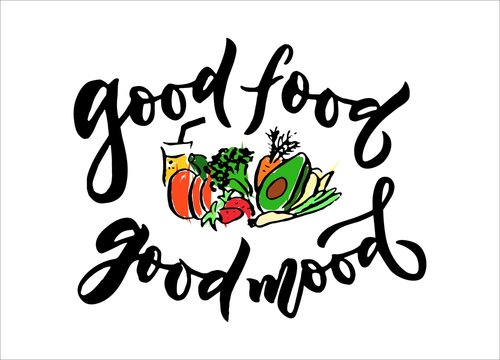Food and mood go hand in hand. What you eat affects your mood — and your mood also affect what you feel like eating.
If you’ve ever used ‘donut therapy’ to survive a breakup, you know how emotional distress can drive you toward sweets + fats. What you might not know is that comfort foods like these often make things worse by keeping you down in the dumps over time.
When low mood leads to a poor diet, the food/mood connection can become a downward spiral that just makes depression worse. Happily, it goes both ways! Over time, a consistently healthy diet can make you happier and more resilient to depression, which then helps you eat healthier and feel even better.
Here are three primary ways dietary patterns can worsen your mood long-term.
Low nutrient intake. If you’re eating a Standard American Diet (aptly known as SAD!), you’re consuming more refined and processed foods, and fewer nutrient-dense whole foods. In our culture, it’s easy to eat this way without trying because convenience and temptation are everywhere. Plus the pressures of modern life put us in a chronically stressed state that makes us more likely to crave the very foods that make us worse over time. The SAD diet can leave us deficient in vitamins (like B vitamins and vitamin D), minerals (like magnesium), antioxidants (such as CoQ10) and essential fatty acids (particularly omega-3) that are required for brain health and a healthy mood.
Refined carbohydrates. The SAD diet features high levels of refined carbohydrates. Even in the short term, diets heavy on refined carbs have been shown to increase depression in healthy volunteers.[1] Over time, eating refined carbs can contribute to systemic inflammation[2], which has been linked to depression[3]. Dietary patterns high in refined carbs also contribute to chronic diseases like diabetes that are themselves linked with depression.[4]
The microbiome. The connection between diet, gut bacteria and health is a booming area of research. While the field is still quite new, we do know that diet affects the composition of our microbiome, and we have evidence that the microbiome can send our brain messages that affect our mood through nerve, inflammatory, and hormonal signals.[5] We’ve seen that those with depression have alterations to their microbiome — and in one study, researchers transplanted the fecal gut microbiota from depressed people into healthy rodents, causing the rodents to behave as if they were depressed.[6] Diets that feature whole, fiber-rich foods plus some fermented foods like yogurt feed a healthy microbiome, while highly processed foods, alcohol, and antibiotics can damage gut microbial diversity.
The Mood-Boosting Diet
This may look like a lot to consider, but here’s the good news: the very same dietary changes can provide optimal nutrient, lower your inflammation, and balance your microbiome all at the same time! If you want to eat your way to a better mood, here are some recommendations:
- Follow a balanced dietary pattern such as the Mediterranean diet, which will give you a higher intake of mood-supporting fruits, vegetables, olive oil, nuts, fish and whole grains.
- Focus on whole foods close to their natural state. Think grilled fish instead of fish-sticks, or a whole apple instead of apple juice.
- Avoid refined carbohydrates, sugar-sweetened drinks, trans fats, commercial bakery items and other processed foods.
- Try substituting chicken, fish, lean pork, tofu or beans in place of red meat.
- Ensure your diet has abundant antioxidants from foods like fruits, vegetables, green tea and dark chocolate.
- Make sure you’re getting optimal levels of omega 3’s, folic acid, vitamin B12 and vitamin D.
- Include a probiotic supplement or increase your intake of fermented foods such as yogurt, kefir, sauerkraut or kim chi.
Next time you’re feeling low, think twice before leaning too long on comfort foods, because any comfort is short lived. Instead, consider investing in a long-term nutritional approach that will help you feel better now and in the future. And if you need help fine-tuning your diet to address depression, anxiety, and other mood issues, please reach out and I’d be delighted to help.
Erika Rothacker, ACN, RDN, LD is a registered dietitian nutritionist at Renaissance Health Center. Please call our main office at 702-258-7860 to schedule an appointment with her today!
Sour e
[1] Firth, J., Gangwisch, J. E., Borisini, A., Wootton, R. E., & Mayer, E. A. (2020). Food and mood: how do diet and nutrition affect mental wellbeing?. BMJ (Clinical research ed.), 369, m2382. https://doi.org/10.1136/bmj.m2382
[2] Buyken, A. E., Goletzke, J., Joslowski, G., Felbick, A., Cheng, G., Herder, C., & Brand-Miller, J. C. (2014). Association between carbohydrate quality and inflammatory markers: systematic review of observational and interventional studies. The American journal of clinical nutrition, 99(4), 813–833. https://doi.org/10.3945/ajcn.113.074252
[3] Osimo, E. F., Pillinger, T., Rodriguez, I. M., Khandaker, G. M., Pariante, C. M., & Howes, O. D. (2020). Inflammatory markers in depression: A meta-analysis of mean differences and variability in 5,166 patients and 5,083 controls. Brain, behavior, and immunity, 87, 901–909. https://doi.org/10.1016/j.bbi.2020.02.010
[4] Moulton, C. D., Pickup, J. C., & Ismail, K. (2015). The link between depression and diabetes: the search for shared mechanisms. The Lancet Diabetes & Endocrinology, 3(6), 461-471.
[5] Firth, J., Gangwisch, J. E., Borisini, A., Wootton, R. E., & Mayer, E. A. (2020). Food and mood: how do diet and nutrition affect mental wellbeing?. BMJ (Clinical research ed.), 369, m2382. https://doi.org/10.1136/bmj.m2382
[6] Firth, J., Gangwisch, J. E., Borisini, A., Wootton, R. E., & Mayer, E. A. (2020). Food and mood: how do diet and nutrition affect mental wellbeing?. BMJ (Clinical research ed.), 369, m2382. https://doi.org/10.1136/bmj.m2382

